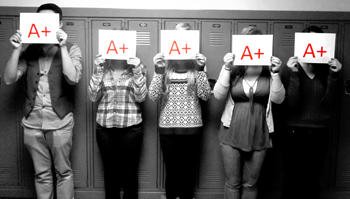What’s Missing in the College Experience? Part 3 of 4
April 10, 2014 Leave a comment
Part 3 of “What’s Missing in the College Experience” – Everyone’s Getting A’s
“There has been an over-saturation of high grades in the academic world lately. I am not nearly the first to write about the subject; the phenomena has caught the attention of many school administrations as well. The truth is that, statistically, most people are average. Most people fall near the middle of a bell curve, but many college professors have been awarding a disproportionate number of A’s to students. The prevalent culture dictates that if you don’t have A’s across the board, you aren’t a good student. This plays heavily into an unrealistic expectation for students of how the world will react to them, and overall it hurts their levels of success in the working world.” (Eli Lisseck ’13)
I don’t think that it’s been any secret in terms how ‘academic creep’ has seeped into our educational institutions. It has certainly been not an isolated manifestation as democratization has worked its way into the fabric of many parts of society; trophies awarded for showing up, everyone on the field getting a ball, surveys (see below) really becoming a simple pass/fail response instead of recognizing shades of grey, etc.
In terms of academia, it has been an increasing trend creeping through the college campuses and taking over the academic culture in a slow, and steadily upward way. Even reaching the Ivy Leagues with the most recent, and perhaps the most publicized showcasing in the news being Harvard and how grade inflation, or the expectation thereof, has become the new rule. In Harvard’s case in particular, the ‘average’ grade is reported as being an ‘A’ with the median grade being an ‘A minus.’ Turns out one of the nation’s most ‘rigorous’ academic programs is also one of the nation’s most lenient graders.
Now how is this even possible you ask? In fact, it is, and should be, statistically impossible for if you were to look at a bell curve, there should be an appropriate distribution of each grade, A through F with the average award being somewhere in the middle near the C range. So, whatever the rumors were about C being average, apparently that’s not the case anymore.
Currently, as an A has become the new C on students’ transcripts, it brings the question to mind, what does earning an ‘A’ even mean anymore if they’re being given out like confetti? I wrote in a previous post about an increase in employer skepticism as they have the luxury in today’s economy to really put the lens of scrutiny on potential candidates in the hiring process. It has changed the hiring process in that there’s nothing really to differentiate a candidate today if you simply look at one’s transcript and academic history; everyone is stellar, spectacular and an A-level scholar. So when an A used to mean that a student was putting in the sweat-equity to earn that mark, now it is looked upon as merely an automatic, an expectation on the employer’s part, so, again, if everyone has one, what is its real value? And if it doesn’t reflect exceptionality, what does?
Further, according to a December Washington Post article, nearly 41 percent of undergraduates obtain a grade of A- or higher, while only 5 percent of undergraduates are receiving grades of C or less, nationally. Again, this is a statistical impossibility of the true bell curve’s measurement of students as a group and, what the grade inflation obviates is, that colleges are losing their grasp on how to gauge students’ work and the ramifications attached to that.
There is a two-fold factor that has contributed to grade inflation making its creep in our nation’s colleges and universities. One is mainly because employers want the ‘best’ students and so it stands to reason that they want to see A’s. If a student receives an A then they must be good. Secondly, in combination with this, generally professors want to help their students and in addition they simply want to be liked, which is perfectly understandable but in an overarching way, in helping, they are hurting.
For an employer who’s hiring on-campus, and A means exceptional, and that’s all they’ll see in the moment. They’ll just see that A, of that student, in that moment which, hypothetically, was awarded to that individual student for his/her perfect competence in Corporate Finance or something of that ilk. They are, or I should say were, unaware that the grade they coveting, could essentially be offered by any student they are to meet.
It reminds me of a recent (analogous) interaction I had when bringing a Volvo in for service. I had the work done, paid the bill and left. Afterwards, I was asked to complete a survey on my ‘experience’ as everything is now an experience. I agreed and the survey was a typical 1-10 sort, meaning 1’s get everyone fired and 10 is exceptional!
Or so I had assumed. In thinking about my ‘experience’ and also thinking it good; I’ll give 7’s & 8’s as I thought it fair and representative of their work. For reference, to me a 1 is either losing the car I came in with or breaking something, making it worse AND charging me for it, while a 10, on the other hand, would be when the work is done for free along with a paid trip to Tahiti!
In any case, shortly after seeing the 7’s & 8’s I recorded on the survey I received a call from the dealer’s “Crisis Team” to mitigate this catastrophe….
They asked me “what was wrong and why was I dissatisfied?”
I said “I wasn’t at all.”
They said “well if that’s the case, then we really aspire to receive 10’s on the survey.”
So, I asked, “if that’s the case, why did you not qualify that to begin with and if so, then what does the 1-9 on your survey really even mean?”
They told me that “anything below a 10 was a failure and they would seek to rectify such.”
That didn’t really answer my question so I again said, “essentially what’s the point of 1-9 then? Shouldn’t it just be pass/fail instead if you’re not allowing for an gradation in the evaluative process? I stated that I was happy with the work, it wasn’t a binary situation of either a 10 (happy) or everything else (sad). I wasn’t willing to just simply give 10’s and if you’re wanting to view this as a ‘failure’ then that is your option to do so.”
Getting back to the issue at hand, academics, the real solution, and the more difficult one, like the service issue I just reflected on, is to deflate the grade nationally across the spectrum. Allow for the shades in between a simple pass or fail structure. Faculty, managers, supervisors, whatever the case may be, must grade throughout the spectrum and be willing to give D’s and C’s for average work, and students must once again feel the need and work hard for the almighty A. If this is the case then the A can once again achieve something in it’s real meaning; being exceptional!



Please Share Us!